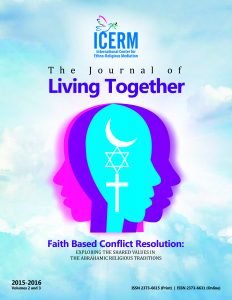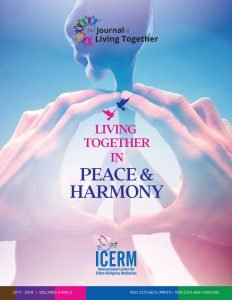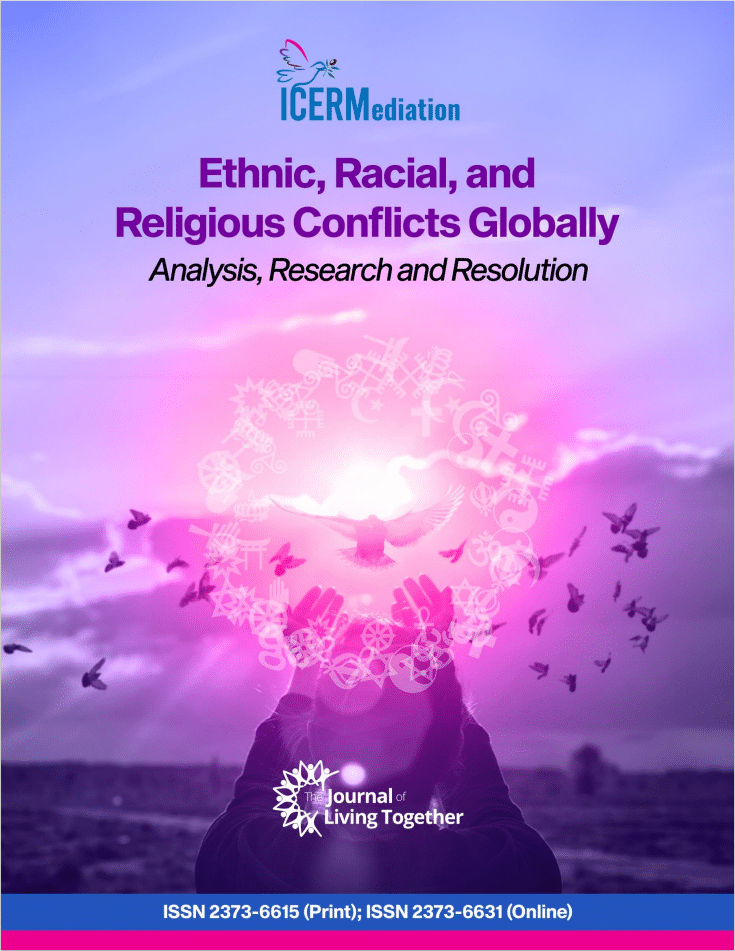Journal of Living Together

ISSN 2373-6615 (Print); ISSN 2373-6631 (Online)
The Journal of Living Together is a peer-reviewed academic journal that publishes a collection of articles that reflect various aspects of peace and conflict studies. The contributions from across the disciplines and grounded by relevant philosophical traditions and theoretical and methodological approaches systematically broach topics dealing with tribal, ethnic, racial, cultural, religious and sectarian conflicts, as well as alternative dispute resolution and peacebuilding processes. Through this journal it is our intention to inform, inspire, reveal and explore the intricate and complex nature of human interaction in the context of ethno-religious identity and the roles it plays in war and peace. By sharing theories, methods, practices, observations and valuable experiences we mean to open a broader, more inclusive dialogue between policymakers, academics, researchers, religious leaders, representatives of ethnic groups and indigenous peoples, as well as field practitioners around the world.
Our Publication Policy
ICERMediation is committed to fostering knowledge exchange and collaboration within the academic community. We do not impose any fees for the publication of accepted papers in the Journal of Living Together. For a paper to be considered for publication, it must undergo a rigorous process of peer review, revision, and editing.
Furthermore, our publications follow an open-access model, ensuring free and unrestricted access for online users. ICERMediation does not generate revenue from journal publication; rather, we provide our publications as a complimentary resource to the global academic community and other interested individuals.
Copyright Statement
Authors retain the copyright of their papers published in the Journal of Living Together. After publication, authors are free to reuse their papers elsewhere, with the condition that proper acknowledgment is given and ICERMediation is informed in writing. However, it is essential to note that any attempt to publish the same content elsewhere requires prior authorization from ICERMediation. Authors must formally request and obtain permission before re-publishing their work to ensure compliance with our policies.
2024 Publishing Schedule
- January to February 2024: Peer-Review Process
- March to April 2024: Paper Revision and Resubmission by Authors
- May to June 2024: Editing and Formatting of Resubmitted Papers
- July 2024: Edited Papers are published in the Journal of Living Together, Volume 9, Issue 1
Past Publications
Publisher’s Preface
Welcome to the International Center for Ethno-Religious Mediation’s Journal of Living Together. Through this journal it is our intention to inform, inspire, reveal and explore the intricate and complex nature of human interaction in the context of ethno-religious identity and the roles it plays in conflict, war and peace. By sharing theories, observations and valuable experiences we mean to open a broader, more inclusive dialogue between policymakers, academics, researchers, religious leaders, representatives of ethnic groups and indigenous peoples, and field practitioners around the world.
Dianna Wuagneux, Ph.D., Chair Emeritus & Founding Editor-in-Chief
It is our intention to use this publication as a way to share ideas, varied perspectives, tools and strategies for the resolution and prevention of ethnic, racial, and religious conflicts within and across borders. We do not discriminate against any people, faith or creed. We do not promote positions, defend opinions or determine the ultimate viability of our authors’ findings or methods. Instead, we open the door to researchers, policymakers, those impacted by conflict, and those serving in the field to consider what they read in these pages and join in productive and respectful discourse. We welcome your insights and invite you to take an active role in sharing what you’ve learned with us & our readership. Together we can inspire, educate and encourage adaptive changes and lasting peace.
Basil Ugorji, Ph.D., President & CEO, International Center for Ethno-Religious Mediation
To view, read or download the past issues of the Journal of Living Together, visit the journal archives.





Call for Papers and Guidelines for Paper Submission
Abstract and / or full paper submissions to the Journal of Living Together are accepted at any time, year-round.
Scope
Papers sought are those written within the last decade and shall focus on any of the following locations: Anywhere.
The Journal of Living Together publishes articles that bridge theory and practice. Qualitative, quantitative or mixed methods research studies are accepted. Case studies, lessons learned, success stories and best practices from academics, practitioners, and policymakers are also accepted. Successful articles shall include findings & recommendations designed to further understanding & inform practical application.
Topics of Interest
To be considered for the Journal of Living Together, papers/articles must focus on any of the following fields or related areas: ethnic conflict; racial conflict; caste based conflict; religious/faith-based conflict; community conflict; religiously or ethnically or racially motivated violence and terrorism; theories of ethnic, racial, and faith-based conflicts; ethnic relations and affiliations; race relations and affiliations; religious relations and affiliations; multiculturalism; civil-military relations in ethnically, racially or religiously divided societies; police-community relations in ethnically, racially, and religiously divided societies; role of political parties in ethnic, racial or religious conflict; the military and ethno-religious conflict; ethnic, racial, and religious organizations/associations and the militarization of conflicts; role of ethnic group representatives, community and religious leaders in conflict; causes, nature, effects/impact/consequences of ethnic, racial, and religious conflict; inter-generational pilots / models for ethnic, racial, and religious conflict resolution; strategies or techniques for reducing ethnic, racial, and religious conflicts; the United Nations’ response to ethnic, racial, and religious conflicts; interfaith dialogue; conflict monitoring, prediction, prevention, analysis, mediation and other forms of conflict resolution applicable to ethnic, racial, and religious conflicts; case studies; personal or group stories; reports, narratives/stories or experiences of conflict resolution practitioners; role of music, sports, education, media, arts, and celebrities in fostering a culture of peace among ethnic, racial, and religious groups; and related topics and areas.
Benefits
Publication in Living Together is a notable way to promote a culture of peace and mutual understanding. It is also an opportunity to gain exposure for you, your organization, institution, association, or society.
The Journal of Living Together is included in the most comprehensive and widely used databases of journals in the fields of social sciences, and peace and conflict studies. As an open access journal, published articles are available online to a global audience: libraries, governments, policy makers, media, universities and colleges, organizations, associations, institutions and millions of potential individual readers.
Guidelines for Submission
- Articles/papers must be submitted with 300-350 word abstracts, and a biography of no more than 50 words. Authors can also send their 300-350 word abstracts before submitting the full articles.
- At the moment, we are accepting proposals written in English only. If English is not your native language, please have a native English speaker review your paper before submission.
- All submissions to the Journal of Living Together must be typed double-spaced in MS Word using Times New Roman, 12 pt.
- If you can, please use the APA Style for your citations and references. If not possible, other academic writing traditions are accepted.
- Please identify a minimum of 4, and a maximum of 7 keywords reflecting the title of your article/paper.
- Authors should include their names on the cover sheet only for purposes of blind review.
- Email graphic materials: photo images, diagrams, figures, maps and others as attachment in a jpeg format and indicate by use of numbers preferred placement areas in the manuscript.
- All articles, abstracts, graphic materials and inquiries should be sent by email to: publication@icermediation.org. Please indicate “Journal of Living Together” in the subject line.
Selection Process
All papers/articles submitted to the Journal of Living Together will be carefully reviewed by our Peer Review Panel. Each author shall then be notified by email about the outcome of the review process. Submissions are reviewed following the evaluation criteria outlined below.
Evaluation Criteria
- The paper makes original contribution
- The literature review is adequate
- The paper is based on a sound theoretical framework and/or research methodology
- The analysis and findings are germane to the objective(s) of the paper
- The conclusions match the findings
- The paper is well organized
- The Journal of Living Together guidelines have been followed properly in preparing the paper
Copyright
Authors retain the copyright of their papers. Authors may use their papers elsewhere after publication provided that proper acknowledgement is made, and that the office of the International Center for Ethno-Religious Mediation (ICERMediation) is notified.
About the Journal of Living Together
The Journal of Living Together is an interdisciplinary, scholarly journal publishing peer-reviewed articles within the field of ethnic conflict, racial conflict, religious or faith-based conflict and conflict resolution.
Living Together is published by the International Center for Ethno-Religious Mediation (ICERMediation), New York. A multi-disciplinary research journal, Living Together focuses on the theoretical, methodological, and practical understanding of ethno-religious conflicts and their methods of resolution with emphasis on mediation and dialogue. The journal publishes articles that discuss or analyze ethnic, racial, and religious or faith-based conflicts or those that present new theories, methods and techniques for ethnic, racial, and religious conflict resolution or new empirical research addressing either ethno-religious conflict or resolution, or both.
To achieve this goal, Living Together publishes several types of articles: long articles that make major theoretical, methodological, and practical contributions; shorter articles that make major empirical contributions, including case studies and case series; and brief articles that target rapidly rising trends or new topics on ethno-religious conflicts: their nature, origin, consequence, prevention, management and resolution. Personal experiences, good and bad, in dealing with ethno-religious conflicts as well as pilot and observational studies are also welcome.
Editorial Board / Peer Review Panel
Papers or articles received for inclusion in the Journal of Living Together are carefully reviewed by our Peer Review Panel.
If you are interested in becoming a member of the Peer Review Panel or would like to recommend somebody, please send email to: publication@icermediation.org.
Peer Review Panel
- Matthew Simon Ibok, Ph.D., Nova Southeastern University, USA
- Sheikh Gh.Waleed Rasool, Ph.D., Riphah International University, Islamabad, Pakistan
- Kumar Khadka, Ph.D., Kenneshaw State University, USA
- Egodi Uchendu, Ph.D., University of Nigeria Nsukka, Nigeria
- Kelly James Clark, Ph.D., Grand Valley State University, Allendale, Michigan, USA
- Ala Uddin, Ph.D., University of Chittagong, Chittagong, Bangladesh
- Qamar Abbas, Ph.D. Candidate, RMIT University, Australia
- Don John O. Omale, Ph.D., Federal University Wukari, Taraba State, Nigeria
- Segun Ogungbemi, Ph.D., Adekunle Ajasin University, Akungba, Ondo State, Nigeria
- Stanley Mgbemena, Ph.D., Nnamdi Azikiwe University Awka Anambra State, Nigeria
- Ben R. Ole Koissaba, Ph.D., Association for the Advancement of Educational Research, USA
- Anna Hamling, Ph.D., University of New Brunswick, Fredericton , NB, Canada
- Paul Kanyinke Sena, Ph.D., Egerton University, Kenya; Indigenous Peoples of Africa Coordinating Committee
- Simon Babs Mala, Ph.D., University of Ibadan, Nigeria
- Hilda Dunkwu, Ph.D., Stevenson University, USA
- Michael DeValve, Ph.D., Bridgewater State University, USA
- Timothy Longman, Ph.D., Boston University, USA
- Evelyn Namakula Mayanja, Ph.D., University of Manitoba, Canada
- Mark Chingono, Ph.D., University of Swaziland, Kingdom of Swaziland
- Arthur Lerman, Ph.D., Mercy College, New York, USA
- Stefan Buckman, Ph.D., Nova Southeastern University, USA
- Richard Queeney, Ph.D., Bucks County Community College, USA
- Robert Moody, Ph.D. candidate, Nova Southeastern University, USA
- Giada Lagana, Ph.D., Cardiff University, UK
- Autumn L. Mathias, Ph.D., Elms College, Chicopee, MA, USA
- Augustine Ugar Akah, Ph.D., University of Kiel, Germany
- John Kisilu Reuben, Ph.D., Kenyan Military, Kenya
- Wolbert G. C. Smidt, Ph.D., Friedrich-Schiller-Universität Jena, Germany
- Jawad Kadir, Ph.D., Lancaster University, UK
- Angi Yoder-Maina, Ph.D.
- Jude Aguwa, Ph.D., Mercy College, New York, USA
- Adeniyi Justus Aboyeji, Ph.D., University of Ilorin, Nigeria
- John Kisilu Reuben, Ph.D., Kenya
- Badru Hasan Segujja, Ph.D., Kampala International University, Uganda
- George A. Genyi, Ph.D., Federal University of Lafia, Nigeria
- Sokfa F. John, Ph.D., University of Pretoria, South Africa
- Qamar Jafri, Ph.D., Universitas Islam Indonesia
- Member George Genyi, Ph.D., Benue State University, Nigeria
- Hagos Abrha Abay, Ph.D., University of Hamburg, Germany
Sponsorship Opportunity
Inquiries about sponsorship opportunities for the upcoming journal issues should be sent to the publisher through our contact page.

